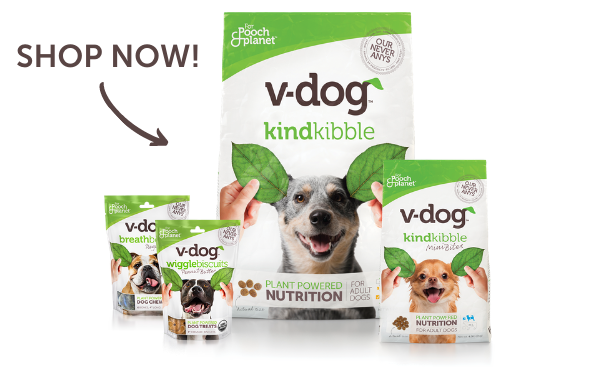Do Vegan Dogs Get Enough Protein?
One of the common arguments against vegan diets for dogs (and vegan diets in general) involves the misconception that plant-based foods can't provide enough protein. Dog parents may be concerned that their pup, who evolved from meat-eating, wolflike ancestors, needs an especially "high-protein" diet in order to truly thrive. Concerns often arise about the grain or carbohydrate content of dog food, and some pet parents may even consider a raw meat diet.

When it comes to your dog's diet, is more protein always preferable? Let's take a closer look at what experts say on this topic.
First thing's first: Do dogs have a dietary requirement for meat?
According to veterinarian Dr. Lorelei Wakefield, "Dogs are in the Order Carnivora, however physiologically (in body function) they are omnivores. This is an evolutionary advantage that they developed as they ate scraps from our ancestors. Dogs can be healthy on a nutritionally complete plant-based diet." She explains that dogs in India have eaten meatless diets for centuries because their caregivers are often vegetarian.
Learn more: Ask the Vegan Vet: Does my dog need to eat meat?
Is plant protein useable for dogs?
"Protein is important," says Dr. Wakefield. "I am pleased to report that dogs can absorb protein from plant-based sources. According to the National Research Council (NRC), dogs require specific nutrients such as protein, not specific feedstuffs such as meat." This means that while dogs absolutely require protein in their diets, it doesn't have to come from an animal source.
Learn more: Where do Vegan Dogs Get their Protein?

What about amino acids? Do plants provide the right amounts?
Dogs require 10 essential amino acids in their diets. According to Dr. Wakefield, "There are 20 amino acids present in proteins, and 10 of those are essential for dogs, meaning they need to consume them in their diet because their bodies don’t make them." A nutritionally balanced diet, whether meat-based or plant-based, supplies appropriate levels of these essential amino acids.
I hear that high-protein/grain-free diets are better. Is this true?
Grain-free diets emerged in the 2000s when multiple pet professionals concluded that many dogs were suffering from allergies to corn and wheat. This trend went hand-in-hand with the assertion that dogs should be fed the "wolf diet" (high meat content). Pet food companies incorporated this notion into their marketing despite scientific knowledge to the contrary: in reality, thousands of years of evolution have made these two species' nutritional needs very different.
If your dog is allergic to a particular grain (wheat and corn are the most common), it is a good idea to avoid that ingredient. Wiping out all grains from the diet isn't necessary, and may even present health risks. When coupled with high protein, grain free diets can overwork the kidneys. Scientists are also currently investigating the effects of grain free diets on heart health.
So how much protein do dogs really need?
It is widely accepted by veterinary professionals that your dog's food should follow the AAFCO guidelines for nutritional levels. These guidelines do not assert that protein must come from any particular source, but do outline appropriate levels for amino acid content (as well as total protein) for both adult dogs (over 1 year old) and growing dogs (under 1 year old). When choosing a diet for your pup, look for the AAFCO statement on the bag or the company's website. Most commercial dog foods, including plant-based varieties like v-dog, are formulated to meet AAFCO standards.
Still have questions about your pup's protein intake? Reach out to us at support@v-dog.com.

Since 2005, v-dog has seen thousands of dogs thrive on our nutritionally complete vegan formula. Our kibble is free of byproducts, fillers, and common allergens, making it a safe and healthy choice for pups of all shapes and sizes. Learn more about v-dog here.
MORE FROM OUR BLOG:
Vegan Diets for Dogs: Healthy or Animal Abuse?






